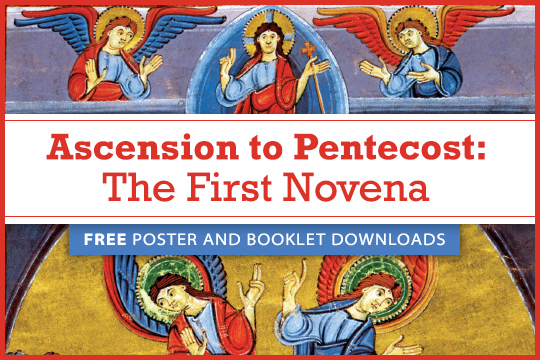![]()
The Ascension of the Lord is a feast that often seems to lack the “punch” of other aspects of the Paschal Mystery. We tend to “get” the Incarnation, the suffering, Death, and Resurrection of Jesus. But why is it important to know that Jesus ascended into heaven? Does this feast simply tell us where he went? And what does it mean that “he is seated at the right hand of the Father?” Is there really a royal court in heaven with a chair for Jesus at the Father’s right hand? I offer the following to help rediscover the powerful message of this feast.
Imagine that a terrible storm caused considerable damage to the area you live in, including your home. Once the storm passes, you and your neighbors emerge from your homes to assess the damage. Relief workers and first responders are everywhere, but everything is in chaos. In fact, some scam artists are posing as relief workers and are seeking to take advantage of folks. In order to figure out how to get help for you, your family, and your neighbors, you would no doubt flag down a first responder or relief worker and ask the following questions:
- Who’s in charge of the relief efforts?
- Where can I find this person so that I can speak to him or her directly?
- What is being done to look after the needs of all these people?
These three questions are at the heart of the celebration of the Ascension of Jesus Christ.
Who’s in Charge?
At Christmas, we welcomed Jesus as our savior. At Easter, we recognized how Jesus saved us. The Ascension tells us that Jesus assumes his place “at the right hand of the Father.” This is not to be taken literally; it is an image that affirms that Jesus has assumed a place of authority over all of creation. Think of the TV show Game of Thrones and the role of the “Hand of the King”—someone who has complete authority to carry out the will of the king. The Ascension affirms once and for all that Jesus is Lord!
Where Can I Find This Person to Speak to Him Directly?
When the Word became Flesh, Jesus, like all human beings, was situated in one geographic location. He was limited by time and space. If you wanted to speak with him, you needed to live at that time and in that location on earth. The Ascension tells us that Jesus has ascended into heaven. Don’t think of this spatially. The Ascension is not telling us that Jesus has left us and is out in the cosmos somewhere. Rather, it is telling us that Jesus is where God is (heaven) and God is accessible throughout all of his creation. The Good News is that we no longer have to travel to a certain location or live during a certain period of time in order to have access to Jesus; we have access to Jesus no matter where we are!
What’s Being Done to Look After the Needs of People?
Jesus made it very clear in his last instructions that his mission was now to be carried out by his followers, under the guidance of the Holy Spirit. The Ascension says as much about the Church as it does about Jesus. (It’s no accident that Luke ends his Gospel with the Ascension and begins the Acts of the Apostles with the Ascension—it is the event that seamlessly ties together Jesus’ mission with his Church.) The Good News is that the mission of Jesus continues through all those who profess him as Lord and do his will!
So, as Ascension approaches, may we celebrate with great joy the Good News that Jesus is in charge; he is completely accessible to us; and his mission of tending to the needs of his people continues to move forward through the Church—his faithful followers among whom we hopefully count ourselves!




Be the first to comment